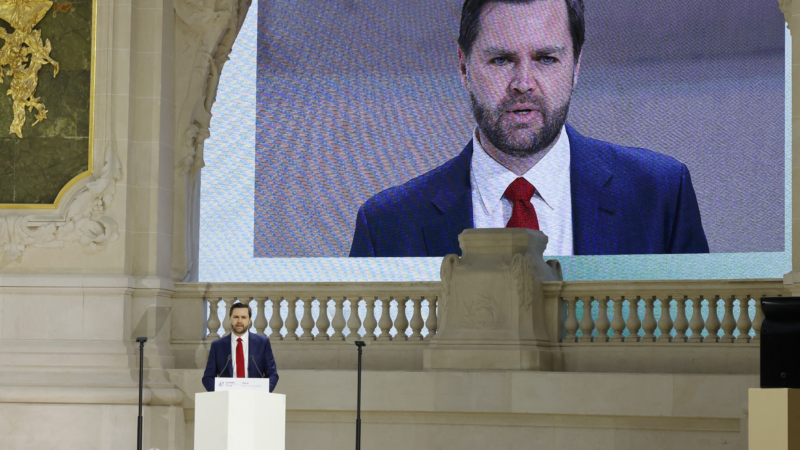After Trump announced talks with Russia, Vance speaks to European allies
Vice President Vance is set to meet with Ukrainian President Volodymyr Zelenskyy on Friday, along with Secretary of State Marco Rubio, on the sidelines of the annual Munich Security Conference.
The meeting with Zelenskyy comes as Ukraine is about to mark three years of war with Russia — during a week where President Trump jumped in on negotiations to end the war.
On Wednesday, President Trump held a lengthy phone call with Russian leader Vladimir Putin, and said the two would meet face-to-face in Saudi Arabia soon. Trump afterward spoke with Zelenskyy over the phone.
On Thursday, Trump reiterated his remarks, and said he believed Putin wants to end the war.
“I know him very well. Yeah, I think he wants peace. I think he would tell me if he didn’t… I trust him on this subject,” Trump said of Putin.
Trump also said Ukraine would be a part of the negotiations to end the war.
“We would have Ukraine, Russia, and we’ll have other people involved. A lot of people, a lot of a lot of forks in this game,” Trump said.
It’s Vance’s first turn on the world stage as vice president
The trip to Germany is part of Vance’s first turn on world stage as vice president. He spoke on Tuesday at a conference on artificial intelligence in Paris before heading to Munich, where the Russia-Ukraine war has been a main focus at the conference in recent years.

But the Trump administration’s posture thus far has appeared to cede more in Russia’s favor — Trump said it’s “unrealistic” for Ukraine to join NATO, something Putin has long been opposed to, and something Zelenskyy argues Ukraine needs in order to prevent future threats from Russia. Trump also said it was unrealistic for Ukraine to gain back its territory from before the war.
On Thursday, Trump told reporters that he believes Russia should be added back into the G7 group of nations. Russia had been in what was previously called the G8, but was removed in 2014 after Putin annexed Crimea.
“I’d love to have them back. I think it was a mistake to throw them out,” Trump said. “It’s not a question of liking Russia or not liking Russia… it still would be helpful to have Russia be a part of that mix.”
Max Bergmann, the director of the Europe, Russia and Eurasia Program at the Center for Strategic and International Studies think-tank, said Trump’s rhetoric is sparking “grave concern” in Ukraine, because the U.S. is taking a more neutral role in negotiations rather than advocating for Ukraine.
“I think there’s a fear that the United States just simply doesn’t want to be a part of it anymore … and so therefore is willing to assert a lot of leverage on Ukraine to essentially agree to what Ukrainians perceive would be a bad deal for them,” Bergmann said.
“And so there’s uncertainty about whether this administration is actually on Ukraine’s side or is trying to act more as a neutral arbiter.”
A ‘whiplash’ for Europeans
Vance has attended the Munich Security Conference in the past, including last year, before he was tapped to be Trump’s running mate.
Last year, Vance said he thinks the United States should “pivot” from NATO and Europe to focus on East Asia. That is going to be the future of American foreign policy for the next 40 years. And Europe has to wake up to that fact,” Vance said.
Bergmann said he expects Vance to reflect this ethos in his remarks on Friday.
“What you see from Vance is the sense that Europe just doesn’t really matter very much to the United States … The U.S. wants a new bargain when it comes to transatlantic security, where it’s going to be Europeans that are responsible for Europe’s security, not the United States,” Bergmann said.
But Bergmann cautioned that there are downsides to de-prioritizing Europe.
“We sort of in some ways get what we pay for by providing Europe security,” Bergmann said. “I think there’s an argument to be made that we should begin to try to rebalance it, and I think the danger of what the Trump administration is trying to do is sort of rebalance it too quickly.”
“This is a real whiplash that the Europeans right now are experiencing and I think are likely to experience when Vance speaks to them at Munich.”
New York Giants hire John Harbaugh as coach after identifying him as their top choice
Harbaugh joins the Giants 11 days after he was fired by the Baltimore Ravens. The Super Bowl champion is now tasked with turning around a beleaguered franchise.
US launches new retaliatory strike in Syria, killing leader tied to deadly Islamic State ambush
A third round of retaliatory strikes by the U.S. in Syria has resulted in the death of an Al-Qaeda-affiliated leader, said U.S. Central Command.
NASA rolls out Artemis II craft ahead of crewed lunar orbit
Mission Artemis plans to send Americans to the moon for the first time since the Nixon administration.
Trump says 8 EU countries to be charged 10% tariff for opposing US control of Greenland
In a post on social media, Trump said a 10% tariff will take effect on Feb. 1, and will climb to 25% on June 1 if a deal is not in place for the United States to purchase Greenland.
‘Not for sale’: massive protest in Copenhagen against Trump’s desire to acquire Greenland
Thousands of people rallied in Copenhagen to push back on President Trump's rhetoric that the U.S. should acquire Greenland.
Uganda’s longtime leader declared winner in disputed vote
Museveni claims victory in Uganda's contested election as opposition leader Bobi Wine goes into hiding amid chaos, violence and accusations of fraud.






